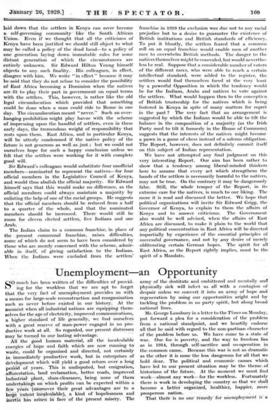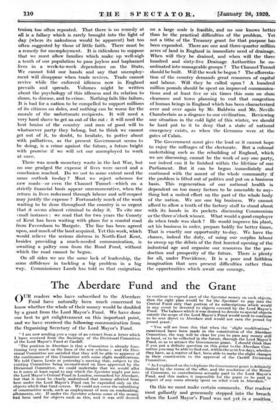Unem lo ment—an 0 ortunit
SO much has been written.of the difficulties of provid- ing for the workless that we are apt to forget that the very fact of unemployment_ provides us with a means for large-scale reconstruction and reorganization such as never before existed in our history. At the moment when 'all industrial nations are equipping them- selves for the age of electricity, improved cominunications, a higher standard 'of life generally, we find ourselves with a great reserve of man-power engaged in no pro- ductive work at all. So regarded, our present distresses . . mayhe turned to our lasting advantage. . All the good human material, all the incalculable energies of lkipe and faith which are now running to waste, could be organized and directed, not certainly in immediately productive work, but in enterprises of deVeleprixent which' will yield a good return over a long peruxl of yeari. This is undisputed, but emigration, .afforestation, land reclamation, better roads, improved Industrial plant, shun-clearance, being none of them undertakings on which profits can be expected within a few years Intel-cover their great advantage's are to a large_ :extent in6alcidahle), a kind of -hopelessness and inertia has arisen in face 'of the "present misery. The army of the destitute and embittered and .mentally and physically sick will infect us all with a contagion of despair unless we convert it into an army -of hope and regeneration by using our opportunities aright and by tackling the ,problem in no party spirit, but along broad national lines.
Mr. George Lansbury in a letter to the Times on Monday, put forward a plea for a consideration of the problem from a national standpoint, and we heartily endorse all that he said with regard to the non-partisan character of the problem before us. We have come to a state..of war. Our foe is poverty, and the way to freedom lies as in 1914, through self-sacrifice and co-operation in the. common cause. Because this war is not so dramatic as the other it is none the less dangerous for all that we hold ,dear. The political and economic causes which have led to our present situation may be the theme, of historians of the future. At the moment we must find work—almost any work—for the workless. _Fortunately there is work in developing the country so that we 'shall became a. _better organized, 'healthier, happier, more prosperous nation. -- That thefe is no one 'remedy f6r unemployment' is' a truism too often repeated. That there is no remedy at all is a fallacy which is rarely brought into the light of day (where its nakedness would be apparent) but too often suggested by those of little faith. There must be a remedy for unemployment. It is ridiculous to suppose that we must allow families which make up , well-nigh a tenth of our population to pass joyless and haphazard lives in a week-to-week dependence on the State. We cannot fold our hands and say that unemploy- ment will disappear when trade revives. Trade cannot revive while the enforced idleness now in England prevails and spreads. Volumes might be written about the psychology of this idleness and its relation to slums, to disease, and to crime. Nothing fails like failure. It is bad for a nation to be compelled to support millions of its citizens on doles, and nothing can be worse for the , morale of the unfortunate recipients. It will need a very hard shove to get-us-out-of the nit : it will need the best brains of the country and men of good will to whatsoever party they belong, but to think we cannot get out of it, to doubt, to hesitate, to potter about with palliatives, as the present Government seems to be doing, is a crime against the future, a future bright with promise if we will set our unemployed to work at once.
There was much monetary waste in the last War, but , no one grudged the expense if lives were saved and a conclusion reached. Do we not to some extent need the same outlook to-day ? Must, we reject schemes for new roads—or even the Channel Tunnel—which on a strictly financial basis appear unremunerative, when the return in lives redeemed through labour and self-respect may justify the expense ? Fortunately much of the work waiting to be done throughout the country is so urgent that it seems almost criminal to delay it. To cite one mall instance : we read that for two years the County of Kent has been waiting with plans for a coastal road from Faversham to Margate. The line has been agreed upon, and much of the land acquired. Yet this work, which would relieve the serious distress in North-East Kent, besides providing a much-needed communication, is awaiting a paltry sum from the Road Fund, without which the road cannot be begun.
On all sides we see the same lack of leadership, the same diffidence in tackling a big problem in a big way. Commissioner Lamb has told us that emigration on a: large scale is feasible, and no one knows better than he the practical difficulties of the problem. Yet not a tithe of the Treasury grant for that purpose has been expended. There are one and three-quarter million acres of land in England in immediate need of drainage. When will they be drained, and when. will the three hundred and sixty-five Drainage Authorities be co- ordinated into manageable groups ? The Channel Tunnel should be built. Will the work be begun ? The afforesta- tion of the country demands great resources of capital and labour. Will they be called upon ? A hundred million pounds should be spent on improved communica- tions and at least five or six times this sum on slum clearance and town planning to end that congestion of human beings in England which has been characterized over and over again by Mr. Baldwin and Mr. Neville . Chamberlain as a disgrace to our civilization. Reviewing our situation in the cold light of this winter, we should be hard put to it to deny that . a state Of national emergency exists, as when the Germans were at the gates of Calais.
The Government must give the lead or it cannot hope to enjoy the suffrages of the electorate. But a colossal undertaking such as the rebuilding of England, which we are discussing, cannot be the work of any one party, nor indeed can it be finished within the lifetime of one Parliament. But it can be begun - immediately and continued with the assent of the whole community if the problem is lifted out of politics-and put on a -business basis. This regeneration of our national health is dependent on too many factors to be amenable to • any- thing but a united effort on the part of the whole -body of the nation. We are one big business. We cannot afford to allow a tenth of the factory staff to stand about with its hands in its pockets diseusSing Communisni or the three o'clock winner. What would a good employer do when trade was slack ? He would improve his plant, set his business in order, prepare boldly for better times. That is exactly our opportunity to-day. We have the chance, indeed the duty, of using our 'surplus labour to sweep up the debris of the first hurried opening of the industrial age and organize our resources for the pro duction and prosperity of the future. - There is plenty for all, under PrOvidence. It is a poor and faithless imagination that sees present difficulties rather thaii the opportunities which await our courage.









































 Previous page
Previous page